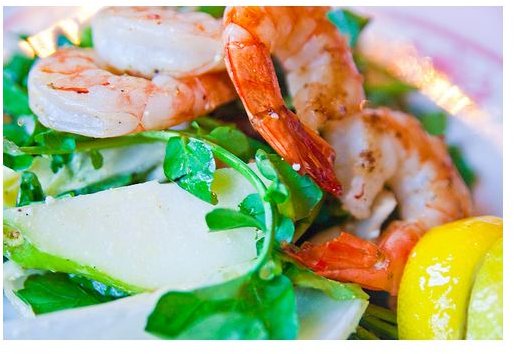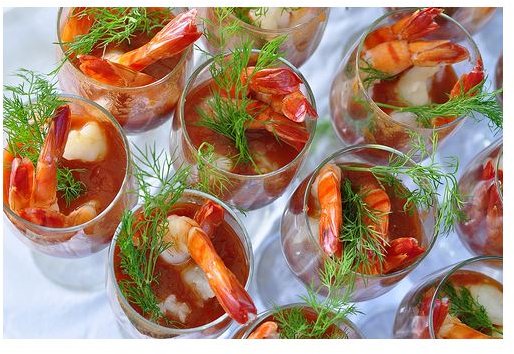Shrimp Nutrition Information: Delectable and Good for You
Plump, pink shrimp cocktail, buttery and rich shrimp scampi, broiled shrimp with mango and avocado, this shellfish is easy to cook and very easy to enjoy. It is also an excellent source of nutrition with a very high mineral content and beneficial omega 3 fatty acids. Shrimp is also a low-fat, low-calorie, carbohydrate-free food, which is great news for dieters looking for healthy sources of protein. Taking an in-depth look at the nutrition information for shrimp you’ll find myriad reasons to enjoy this delectable seafood.
The Skinny on Shrimp
A four ounce serving of steamed or boiled shrimp is only going to have about 112 calories. Compared to a slice of roast beef or even a chicken breast, this is a very small amount for such an excellent source of protein — good news for calorie counters.
What is even better news for the health-conscious inclined is what those calories are comprised of — 24 grams of energizing, immune supporting protein, and 2.5 grams (15% of the daily recommended amount) of brain-supporting, skin-healthy omega 3 fatty acids. While protein may be an easy nutrient to find in food, omega 3’s are more elusive. Getting enough of them is very important, especially for pregnant women, so don’t hold back on a regular serving of shrimp.
While extremely low in fat, shrimp is high in cholesterol, with more than half of the daily allowance in one serving. Should this be a concern

for people who are trying to watch their cholesterol levels? No more so than eating two large eggs once in awhile, which actually raises LDL, or bad cholesterol levels slightly more than a serving of shrimp. Also, research has shown that including this shellfish in the diet may decrease triglyceride levels.
Sea Nutrients
More great news on shrimp nutrition — this food is an excellent source of many minerals and other nutrients. It is a great source of vitamin B12 (28% of the daily recommended amount). Vitamin B12 helps to manage homocysteine levels; high amounts of homocysteine are linked to cardiovascular disease. This vitamin is also important for a healthy nervous system.
Shrimp is also rich in the antioxidant mineral selenium. This nutrient helps to protect lipids from oxidative damage, and has been shown in research to lower the risk of several cancers, including colorectal, lung, and prostate, when added to the diet over a long period of time. Along with vitamin E, selenium is essential for protecting the heart and liver. Deficiencies are linked to cancer, heart disease, high cholesterol, and exhaustion. One serving of shrimp supplies about 64% of the daily recommended amount.
Another important factor in shrimp nutrition is tryptophan content. One serving has all you need for a day of this essential amino acid. This nutrient helps with the production of the neurotransmitter serotonin. A lack of this brain chemical can lead to depression, insomnia, and unstable moods. Tryptophan also is beneficial for relieving stress, heart health, and reducing appetite.
Shrimp is also a good source of vitamin D. Like vitamin B12, this is a nutrient that people who do not eat meat or dairy should make an extra effort to include in the diet. It is needed for the absorption of calcium as well as phosphorus. It prevents muscle weakness, helps to regulate the heart beat, and is so important for the growth of children. Four ounces of cooked shrimp supplies 40% of the daily requirement for vitamin D.
Other nutrients found in shrimp include iron, zinc, phosphorus, vitamin B3, copper, and magnesium.
Shrimp nutrition information is reason enough to make this shellfish a part of a healthy diet. Versatile and delicious, next time you enjoy this fruit of the sea know that you are supplying your body with a nutrient-dense food.
References
World’s Healthiest Foods https://whfoods.org/genpage.php?tname=foodspice&dbid=107
Omega 3 Fatty Acids. University of Maryland Medical Center https://www.umm.edu/altmed/articles/omega-3-000316.htm
Balch, Phyllis A. " Prescription for Nutritional Healing." Fourth Edition (Penguin Books, 2006).
photo by Special KRB (CC/flickr) https://www.flickr.com/photos/specialkrb/3860329426/sizes/m/in/photostream/
photo by: Steven DePolo (CC/flickr) https://www.flickr.com/photos/stevendepolo/4529209085/sizes/m/in/photostream/
